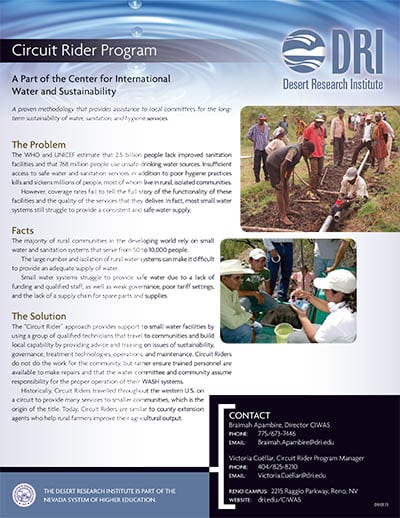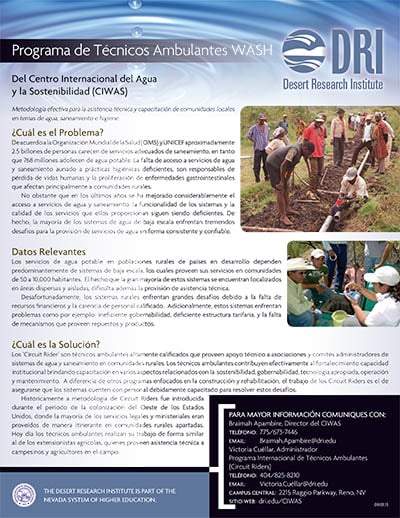Center for International Water and Sustainability
International Circuit Rider Program
Globally, 2 billion people still lack access to safe water and 3.6 billion live without access to improved sanitation, with 122 million people still collecting drinking water directly from surface water sources (WHO/UNICEF Joint Monitoring Programme 2021). Access to WASH is essential to developing countries’ efforts to meet socioeconomic and public health improvement targets while building sustainable infrastructure is the first step towards WASH service provision. The importance of WASH interventions to developing countries cannot be overstated. WASH interventions have been shown to produce economic benefits ranging from US$5 to US$46 per US$1 invested. Investment in hygiene promotion, sanitation and safe water access is also one of the most cost-effective ways to reduce child mortality. As of 2019, over 1.4 million deaths could have been prevented with proper access to safe WASH services with 89% of the global WASH attributable deaths occurring in low- and middle-income countries (WHO 2019).
Contaminated water and poor sanitation contribute to 88% of all diseases in the developing world (WHO/UNICEF, 2004) and Almost 400,000 children died from from poor hygiene practices, contaminated drinking water, and poor sanitation in 2019 (WHO 2019)..
Today, the majority of rural and peri-urban communities in the developing world rely on small water systems serving 50 to 10,000 people. Small systems struggle, however, to provide consistent and sustainable safe water access for a number of reasons, including a lack of funds and qualified staff to provide regular operations and maintenance, weak water committee governance, poor tariff settings and collection policies, a lack of a supply chain for spare parts and supplies, and aging infrastructure.
To address this challenge, CIWAS takes an approach of post-construction support and implements the International Circuit Rider program.
CONTACT
Braimah Apambire, Ph.D.
Program Director
775.673.7556
Braimah.Apambire@dri.edu
LOCATION
Desert Research Institute
2215 Raggio Parkway
Reno, NV 89512
DIVISION
Hydrologic Sciences
About
Since 1976, the Circuit Rider Program has worked in the United States to successfully address the needs of small WASH system operators and administrators, which are similar to those faced by developing nations. The program has a proven track record of increasing the institutional capacity of service providers by increasing the professional expertise of water operators, managers, and board members. A small group of qualified WASH technicians, known as Circuit Riders, rotate through a circuit of communities, providing advice and training to local operators on issues of sustainability, governance, treatment technologies, operations, and maintenance. Over time, the Circuit Riders increase the capacity of communities they serve to assume effective responsibility for their WASH systems.
Circuit Riders provide on-site support and training in three key areas:
Technical: Circuit Riders train local operators such as plumbers and operation and maintenance technicians on repairing water and sanitation systems and providing instruction on disinfection procedures, source water protection, and water quality sampling and monitoring protocols, as well as advice on upgrading and expanding water services.
Administration: To improve the administrative capacity of communities, Circuit Riders provide training to local water committee members in WASH governance, tariff setting and collection, basic accounting and bookkeeping, and accountability to users.
Community: There is a need to promote safe water handling and best hygiene and sanitation practices among community members. Training is designed to build the capabilities of water board committee members to do WASH promotion activities among water users.
In addition to these three areas, the training covers the principles of integrated water resources and watershed management.
The return on investment for Circuit Rider programs is clear:
- Cost to build water systems: on average, $85 USD per household
- Cost of failed services: on average, approximately 50% of investments have been wasted on failed water points.
- Cost of poor services: on average, 11% of investments are wasted on water systems that provide bad services.
- Cost of Circuit Rider program: less than $1 USD per household per year
Studies also indicate Circuit Rider programs significantly improve the reliability and quality of services. Overall, WASH interventions, assuming they lead to lasting services, have been shown to produce economic benefits ranging from USD $5 to USD $46 per USD $1 invested.
CIWAS has developed and implemented three Circuit Rider Programs to date in Ghana, Chile, and Honduras.
Highlights: DRI Student Interns Join Efforts to Improve Drinking Water Access in Ghanaian Communities 2022
Program Approach
The success of the Circuit Rider model relies not only on the trained technicians themselves, but also the various players that operate and utilize WASH services. The host organization, such as a local government division, is responsible for overseeing the Circuit Riders and maintaining program sustainability. Associations, or local water committees, manage the administrative aspects of the water systems that Circuit Riders help them oversee, while operators are responsible for the day-to-day activities of service provision. Finally, customers of the service, who are the community members, make use of the WASH services provided and pay user fees. While not all Circuit Rider programs follow this exact structure, this provides a framework to be modeled around.
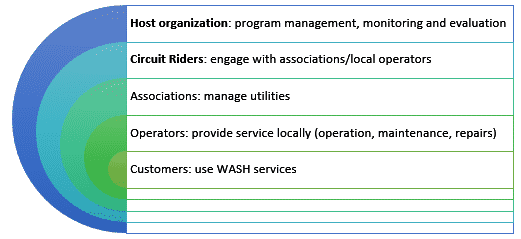
CIWAS’ approach is focused on addressing the lack of qualified staff and financial resources, the previously identified barriers to sustainable WASH service provision in rural areas. Integral to this approach is fostering strong partnerships with local governments or local organizations while increasing the technical and managerial capabilities of host organization and local technicians, who have the familiarity and knowledge to appropriately serve their associations, operators, and customers. By taking this approach, a framework to develop permanent support for the program is built up.
CIWAS provides operational support to set up the Circuit Rider program, followed by training for the host organization and Circuit Riders. Operational support to the host organization is important to ensure that the program is implemented with all the parts in place. Thus, CIWAS helps hosts to adapt program guidelines to the specific context, identify stakeholders, and implement the program, and also provides guidance on ongoing activities such as financing, monitoring and evaluation, recruitment, and training. Then, CIWAS conducts training for both the host organization and the Circuit Riders to establish a foundational knowledge on WASH, while Circuit Riders receive more technical training that they will use in the field (which is optional for host organization staff). As CIWAS is not involved directly with community members, Circuit Riders are provided with the tools and training to do so. In general, CIWAS is involved in the program (implementation through follow-up) over the course of two years, beyond which the local government or local agency is expected to lead the program.
History
The origins of the International Circuit Rider program stem from the United States’ National Rural Water Association (NRWA). The NRWA was formed in 1976 in response to the Safe Drinking Water Act, and provides technical support to small and rural water systems on a membership basis. The Circuit Rider program was created by NRWA in 1980, formalizing this support through the provision of water and wastewater experts who would rotate through communities. The program was piloted in a few water systems in the state of Oklahoma and progressively expanded to assist its current base of over 31,000 members, training 100,000 people annually from 60,000 WASH facilities in 50 States. NRWA’s services are provided in part through funding from the U.S. Department of Agriculture and the Environmental Protection Agency.
In early 1991, with the support from NRWA, a local organization from Honduras (AHJASA) adopted the Circuit Rider model. In 1998, with financial assistance from USAID, the model was incorporated into the country’s water authority (SANAA). By 2001, the CR program was providing technical assistance to almost 5,000 water utilities covering the whole country. The model was eventually adopted by other NGOs from El Salvador in 2001 (ASSA), and by Agua del Pueblo (ADP) in Guatemala, and in the Dominican Republic in 2005. The Peace Corps in Panama introduced the model into their WASH activities in 2011.
The Desert Research Institute has hosted the International Circuit Rider Program since 2013, and to further build local capacity for sustainable WASH systems has developed a training program, which uses the Circuit Rider methodology to set up technical assistance programs in target countries. The Circuit Rider program has a proven track record of increasing the institutional capacity of service providers by increasing the professional expertise of water operators, managers, and board members.
Projects
To date, CIWAS has implemented the Circuit Rider program successfully in Ghana, Malawi, Chile, and Honduras.

Ghana
In 2016, CIWAS partnered with the Community Water and Sanitation Agency and the University for Development Studies (UDS) to provide training and materials resources to six Area Mechanics, who already provided repair services to rural communities of a total population of 134,450.
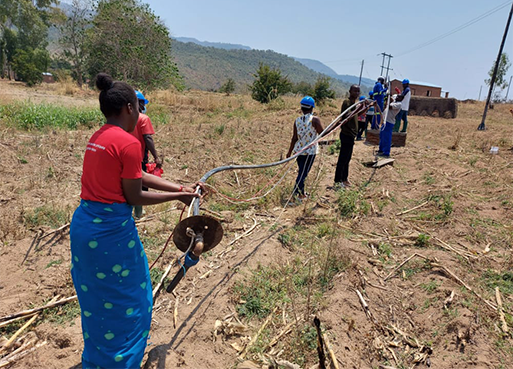
Malawi
Since 2021, DRI, TI, and local NGO, DAMRA, have implemented an adapted CR methodology to fit the specific needs of Healthcare Facilities (HCFs) in Rumphi District, Malawi.
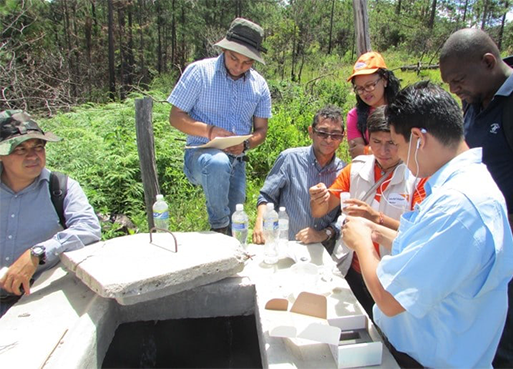
Honduras
CIWAS has partnered with Rotary, WASRAG and local NGO Honduran Association of Water System Administrators (AHJASA) to design more effective post-construction support for Rotary-sponsored water systems across Honduras.
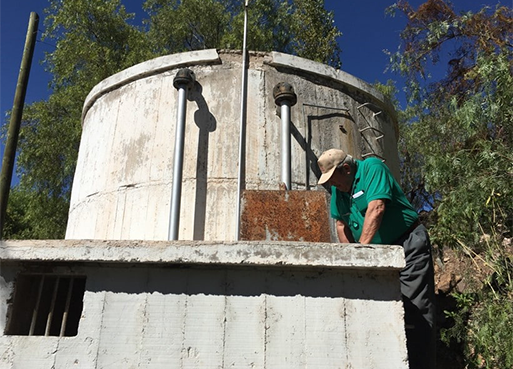
Chile
CIWAS collaborated with social enterprise TOHL and the municipality of Río Hurtado in Chile on a post-construction support program for existing small water systems in the municipality.
Ghana
In 2016, CIWAS partnered with the Community Water and Sanitation Agency and the University for Development Studies (UDS) to adapt and implement a pilot program in the East Gonja Municipal Assembly district. CIWAS provided training and materials resources to six Area Mechanics, who already provided repair services to rural communities of a total population of 134,450 (2010 census).
Background:
In 2020, 59% of rural Ghanaians lacked access to safe water according to the WHO/UNICEF Joint Monitoring Program report 2021. The two main challenges are: lack of professional capacity and lack of sufficient funding. Two main challenges are at the root of these problems: a lack of professional capacity and a lack of sufficient funding.
DRI-CIWAS Progress
Beyond strengthening the existing project in East Gonja District, DRI has expanded to two new districts – North Gonja and NorthEast Gonja Districts.
Ghana Study
Based on data collected by DRI, more than 96% of household water samples from all three Districts tested positive for coliform (2021).
Scope:
The Circuit Rider model addresses these challenges by providing additional training to technicians and administrators. By receiving training in topics including water quality testing, financial management, and record-keeping, the new Circuit Riders have increased their scope of services and acquired entrepreneurial skills and thus, a steady stream of income so that they can maintain their position as a Circuit Rider. By training administrators as well, the model ensures that WASH services are managed holistically and that monitoring systems are in place as administrators review and analyze data that has been collected periodically by Circuit Riders.
The training topics included:
Circuit Rider training
- Administrative tools and skills for guiding water committees
- Community behavior change principals
- Small-business tools and skills
- Use of cellphone and internet-based portals in WASH
District Assemblies and Area Councils
- Monitoring, evaluation, learning, and reporting
- Stakeholders’ roles and responsibilities for management
- Procurement and contracting
- Financial management, reporting, and sustainability
An additional challenge revealed through this project was that of transportation, which prevented the mechanics from reaching their communities reliably. Thus, CIWAS partnered with the District Assembly to loan motor tricycles to the Circuit Riders, which also provides a source of additional income for them.
With evolving needs, DRI’s International Circuit Rider Program in Ghana has continued to support the local water committees while expanding our reach to address WASH needs in Healthcare Facilities (HCFs). DRI CIWAS conducted baseline assessments in Health Care Facilities to expand CR support for WASH in community clinics in North Gonja and North East Gonja districts. The data informed the status of WASH in the facilities and identified necessary interventions to implement. DRI also works closely with local authorities to maximize the resources and impact of the project – the District Health Director for North Gonja declared DRI-CIWAS as a development partner to Ghana Health Service in the District.
Honduras:
CIWAS has partnered with Rotary, WASRAG and local NGO Honduran Association of Water System Administrators (AHJASA) to design more effective post-construction support for Rotary-sponsored water systems across Honduras. To date, over 90 Rotary-sponsored water systems have been built in Honduras, representing an investment of approximately US$ 5 million.
DRI completed an assessment of the functionality of these systems across Honduras in 2017 and completed a final report of findings and recommendations. Though most systems were found to be operational, the majority were not providing water 24/7 and were not being optimally managed and run. (Link to Summary Report and Recommendation). In the next stage of this project, DRI will provide capacity-building workshops to address technical knowledge gaps of small water system managers identified through the assessment. To learn more information, read the Summary of Study Results and Recommendations on the Honduras WASH Project: An Evaluation of Rotary-Funded Water Systems.
COVID-19 response
CIWAS supported AHJASA to organize and adapt their CR program trainings to a virtual format. There were significant field training limitations due to COVID-19 restrictions.
Upcoming Work
DRI-CIWAS and partners are working towards securing funding for Phase 2 of the evaluation of Rotary-sponsored water systems in Honduras.
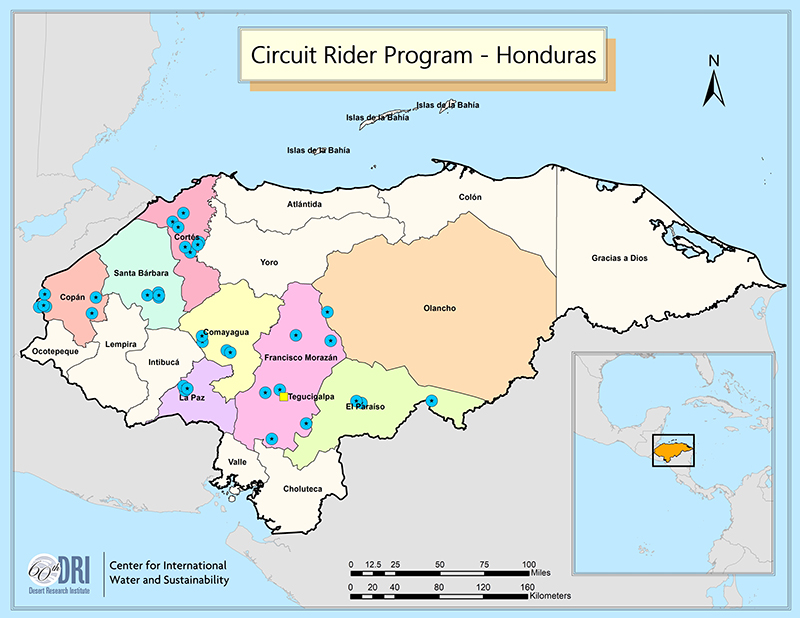
Chile:
CIWAS collaborated with social enterprise TOHL and the municipality of Río Hurtado in Chile on a post-construction support program for existing small water systems in the municipality. In response to the municipality’s need to build resiliency into their water systems, CIWAS conducted an assessment, identified areas for improvement, and developed training materials for local technicians. Meanwhile, TOHL recruited an individual Circuit Rider to oversee the communities, and the municipality coordinated activities and services.
Outcomes
Through the support provided by the CR:
- The community operators became more knowledgeable about the mechanics and electrical workings of their systems, enabling them to operate their infrastructure more efficiently.
- Community water boards submitted proposals to the Department of Water Works for capital improvements
- There were increased networking opportunities between communities to encourage collaborative work
CIWAS provided the municipality and TOHL with guidance and technical assistance on designing a Circuit Rider program specifically tailored to Río Hurtado’s needs as well a Monitoring and Evaluation (M&E) framework to assess impact. Meetings were also held at La Serena University with Cazalac – the Regional Water Center for Arid and Semi-Arid Zones in Latin America and the Caribbean- to discuss the potential of participating in CIWAS’ WASH Capacity Building Program.
Upcoming Work
CIWAS is currently collecting follow-up survey results from the CR, the CR program managing water office, and community water committees for future programming.
WASH in Health Care Facilities, Malawi:
Adapting Circuit Rider Methodology: WASH in Health Care Facilities
The Circuit Rider Methodology is not limited to rural-community-based systems. Under the World Health Organization (WHO)’s call to action and goal of ensuring 100% WASH coverage in health-care facilities (HCFs) by 2030, DRI has partnered with Transform International (TI) to explore how the Circuit Rider Program and other methodologies can improve and shape the sustainability of WASH services at low-resource HCFs.
The Problem
The recent WHO report showed that a significant proportion of health-care facilities completely lack or have very limited access to WASH services. Existing WASH facilities lack infrastructure, as well as proper usage, operational, and maintenance practices. These deficiencies not only have implications for public health, but also pose significant barriers to the long-term sustainability of WASH at these facilities.
Developing a methodology for long-term sustainability of WASH in HCFs
DRI, Transform International, and local NGO, DAMRA, have adapted the CR methodology to fit the needs of HCFs in Rumphi District, Malawi. The pilot program, in 18 HCFs, started in 2021 and consists of:
- 4 Quality of Care (QoC) CRs
Tasked with providing assistance and capacity building to HCF staff on infection prevention, hand hygiene, and proper facility cleaning and waste management
- 4 Technical (T) CRs
Tasked with providing technical assistance, aid in maintenance and repair, and capacity building to those managing the WASH and waste management infrastructure
All CRs visit the HCFs once a month. A monitoring, evaluation, resolution, and learning (MERL) framework has been put in place to assess progress.

Figure 4. Circuit Rider Water Systems Training in Malawi
